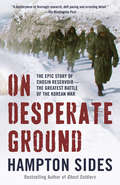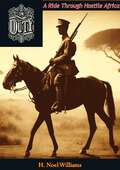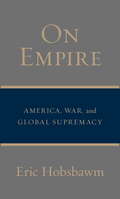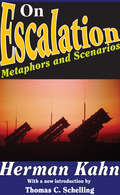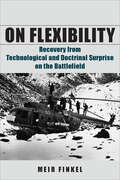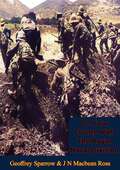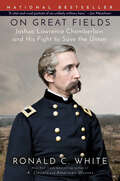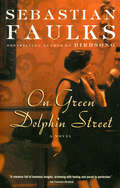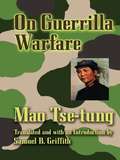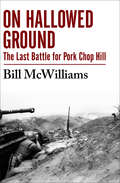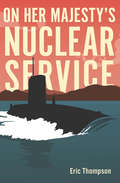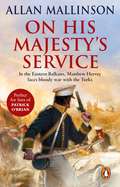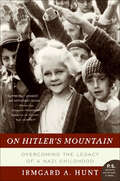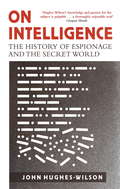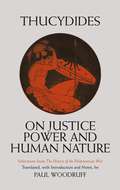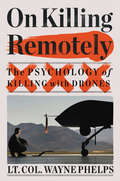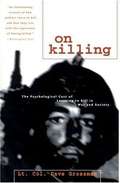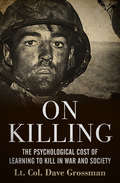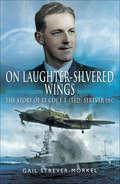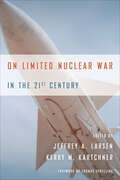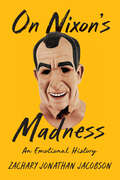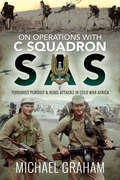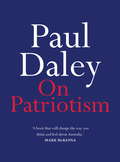- Table View
- List View
On Desperate Ground: The Marines at The Reservoir, the Korean War's Greatest Battle
by Hampton SidesFrom the New York Times bestselling author of Blood and Thunder and Ghost Soldiers, a chronicle of the extraordinary feats of heroism by Marines called on to do the impossible during the greatest battle of the Korean War."Superb ... A masterpiece of thorough research, deft pacing and arresting detail...This war story—the fight to break out of a frozen hell near the Chosin Reservoir—has been told many times before. But Sides tells it exceedingly well, with fresh research, gritty scenes and cinematic sweep." —The Washington PostOn October 15, 1950, General Douglas MacArthur, Supreme Commander of UN troops in Korea, convinced President Harry Truman that the Communist forces of Kim Il-sung would be utterly defeated by Thanksgiving. The Chinese, he said with near certainty, would not intervene in the war.As he was speaking, 300,000 Red Chinese soldiers began secretly crossing the Manchurian border. Led by some 20,000 men of the First Marine Division, the Americans moved deep into the snowy mountains of North Korea, toward the trap Mao had set for the vainglorious MacArthur along the frozen shores of the Chosin Reservoir. What followed was one of the most heroic--and harrowing--operations in American military history, and one of the classic battles of all time. Faced with probable annihilation, and temperatures plunging to 20 degrees below zero, the surrounded, and hugely outnumbered, Marines fought through the enemy forces with ferocity, ingenuity, and nearly unimaginable courage as they marched their way to the sea.Hampton Sides' superb account of this epic clash relies on years of archival research, unpublished letters, declassified documents, and interviews with scores of Marines and Koreans who survived the siege. While expertly detailing the follies of the American leaders, On Desperate Ground is an immediate, grunt's-eye view of history, enthralling in its narrative pace and powerful in its portrayal of what ordinary men are capable of in the most extreme circumstances.Hampton Sides has been hailed by critics as one of the best nonfiction writers of his generation. As the Miami Herald wrote, "Sides has a novelist's eye for the propulsive elements that lend momentum and dramatic pace to the best nonfiction narratives."
On Duty: A Ride Through Hostile Africa
by Parker GillmoreEmbark on a daring adventure through the untamed landscapes of 19th-century Africa with Parker Gillmore's On Duty: A Ride Through Hostile Africa. This gripping narrative offers a vivid account of Gillmore's perilous journey across the continent, providing readers with an intimate glimpse into the challenges and dangers faced by explorers during this era.Parker Gillmore, an intrepid traveler and seasoned hunter, recounts his experiences as he navigates through regions marked by political unrest, diverse wildlife, and unpredictable terrain. On Duty captures the spirit of exploration and the relentless pursuit of discovery that characterized the age of imperial expansion.Gillmore's narrative is rich with detailed descriptions of the African landscape, from dense jungles and arid savannas to majestic rivers and towering mountains. His keen observations bring to life the beauty and brutality of the natural world, offering readers a sensory journey through some of the most remote areas of the continent.This book is an essential read for history enthusiasts, adventure seekers, and anyone interested in the exploration of Africa. Parker Gillmore's engaging storytelling and firsthand account provide a fascinating perspective on the trials and triumphs of life on the frontier.Join Parker Gillmore on his extraordinary ride through hostile Africa and experience the thrill of exploration and the enduring allure of the unknown. On Duty is a timeless chronicle of adventure, discovery, and the indomitable human spirit.
On Empire: America, War and Global Supremacy
by Eric HobsbawmIn there four incisive and keenly perceptive essays, one of out most celebrated and respected historians of modern Europe looks at the world situation and some of the major political problems confronting us at the start of the third millennium.With his usual measured and brilliant historical perspective, Eric Hobsbawm traces the rise of American hegemony in the twenty-first century. He examines the state of steadily increasing world disorder in the context of rapidly growing inequalities created by rampant free-market globalization. He makes clear that there is no longer a plural power system of states whose relations are governed by common laws--including those for the conduct of war. He scrutinizes America's policies, particularly its use of the threat of terrorism as an excuse for unilateral deployment of its global power. Finally, he discusses the ways in which the current American hegemony differs from the defunct British Empire in its inception, its ideology, and its effects on nations and individuals.Hobsbawm is particularly astute in assessing the United States' assertion of world hegemony, its denunciation of formerly accepted international conventions, and its launching of wars of aggression when it sees fit. Aside from the naivete and failure that have surrounded most of these imperial campaigns, Hobsbawm points out that foreign values and institutions--including those associated with a democratic government--can rarely be imposed on countries such as Iraq by outside forces unless the conditions exist that make them acceptable and readily adaptable.Timely and accessible, On Empire is a commanding work of history that should be read by anyone who wants some understanding of the turbulent times in which we live.From the Hardcover edition.
On Escalation: Metaphors and Scenarios
by Herman KahnIn this widely discussed and influential book, Herman Kahn probes the dynamics of escalation and demonstrates how the intensification of conflict can be depicted by means of a definite escalation ladder, ascent of which brings opponents closer to all-out war. At each rung of the ladder, before the climb proceeds, decisions must be made based on numerous choices. Some are clear and obvious, others obscure, but the options are always there.Thermonuclear annihilation, says Kahn, is unlikely to come through accident; but nations may elect to climb the ladder to extinction. The basic material for the book was developed in briefings delivered by Kahn to military and civilian experts and revised in the light of his findings of a trip to Vietnam in the 1960s. In On Escalation he states the facts squarely. He asks the reader to face unemotionally the terrors of a world fully capable of suicide and to consider carefully the alternatives to such a path.In the never-never land of nuclear warfare, where nuclear incredulity is pervasive and paralyzing to the imagination even for the professional analyst, salient details of possible scenarios for the outbreak of war, and even more for war fighting, are largely unexplored or even unnoticed. For scenarios in which war is terminated, the issues and possibilities of which are almost completely unstudied, the situation is even worse. Kahn's discussion throws light on the terrain and gives the individual a sense of the range of possibilities and complexities involved and are useful.
On Flexibility: Recovery from Technological and Doctrinal Surprise on the Battlefield
by Meir FinkelThis book addresses one of the basic questions in military studies: How can armies cope effectively with technological and doctrinal surprises-ones that leave them vulnerable to new weapons systems and/or combat doctrines? Author Meir Finkel contends that the current paradigm-with its over-dependence on intelligence and an all-out effort to predict the nature of the future battlefield and the enemy's capabilities-generally doesn't work. Based on historical case analysis of successful "under-fire" recovery and failure to recover, he identifies the variables that have determined these outcomes, and he presents an innovative method for military force planning that will enables armies to deal with the uncertainties of future wars "in real time. " His proposed method combines conceptual, doctrinal, cognitive, command, organizational, and technological elements to produce optimal battlefield flexibility and adaptability. He then demonstrates that, when properly applied, this method can eliminate most obstacles to overcoming battlefield surprises.
On Four Fronts with the Royal Naval Division
by Geoffrey Sparrow J N Macbean Ross“The Blue Jackets who fought on landThe time of Nelson was not only notable because of the success in nautical warfare of the man himself, but also because it was the zenith of the 'age of sail' that left British sea power so dominant that Britannia really did 'rule the waves.' No navy could stand against the might of the Royal Navy, and so until Jutland during the Great War it would not fight another major battle at sea. Queen Victoria's ever expanding empire meant that British forces were perpetually set against often underdeveloped powers and the navy took its part, but most of the hard work of empire building would inevitably fall upon the British army. Of course, the Royal Navy had its own 'soldiers'—the Royal Marines. The particular talents and skills of sailors were often required, particularly whilst manning 'the guns, ' so the 19th century saw the 'blue jackets' in action in the Crimean War, the Indian Mutiny, the Zulu War, the Boer War and several other conflicts. The early years of the 20th century brought a period of instability that inexorably dragged the great powers of Europe towards the cataclysm of blood which was to be the Great War of 1914-18...The Royal Naval Division was formed around a cadre of Royal Marines and sailors and was expanded as a unit of the New Army by volunteers. The Division saw action in the defence of Antwerp in 1914, on Helles and Anzac during the disastrous Gallipoli Campaign in 1915 and on the Western Front where it took part in the Battle of the Somme in 1916 and the Third Battle of Ypres in 1917. This book was written by one of the their number and is an often light-hearted account of the wartime record of the division, full of incident and anecdote and scattered with occasionally humorous line drawings. There is little in print about the Royal Naval Division in the First World War so this will make a welcome addition to any naval library.”-Print ed.
On Great Fields: The Life and Unlikely Heroism of Joshua Lawrence Chamberlain
by Ronald C. WhiteNATIONAL BESTSELLER • From the author of A. Lincoln and American Ulysses comes the dramatic and definitive biography of Joshua Lawrence Chamberlain, the history-altering professor turned Civil War hero.&“A vital and vivid portrait of an unlikely military hero who played a key role in the preservation of the Union and therefore in the making of modern America.&”—Jon Meacham, Pulitzer Prize–winning author of And There Was LightFINALIST FOR THE GILDER LEHRMAN LINCOLN PRIZE AND THE AMERICAN BATTLEFIELD TRUST BOOK PRIZE FOR HISTORYBefore 1862, Joshua Lawrence Chamberlain had rarely left his home state of Maine, where he was a trained minister and mild-mannered professor at Bowdoin College. His colleagues were shocked when he volunteered for the Union army, but he was undeterred and later became known as one of the North&’s greatest heroes: On the second day at Gettysburg, after running out of ammunition at Little Round Top, he ordered his men to wield their bayonets in a desperate charge down a rocky slope that routed the Confederate attackers. Despite being wounded at Petersburg—and told by two surgeons he would die—Chamberlain survived the war, going on to be elected governor of Maine four times and serve as president of Bowdoin College.How did a stuttering young boy come to be fluent in nine languages and even teach speech and rhetoric? How did a trained minister find his way to the battlefield? Award-winning historian Ronald C. White delves into these contradictions in this cradle-to-grave biography of General Joshua Lawrence Chamberlain, from his upbringing in rural Maine to his tenacious, empathetic military leadership and his influential postwar public service, exploring a question that still plagues so many veterans: How do you make a civilian life of meaning after having experienced the extreme highs and lows of war?Chamberlain is familiar to millions from Michael Shaara&’s now-classic novel of the Civil War, The Killer Angels, and Ken Burns&’s timeless miniseries The Civil War, but in this book, White captures the complex and inspiring man behind the hero. Heavily illustrated and featuring nine detailed maps, this gripping, impeccably researched portrait illuminates one of the most admired but least known figures in our nation&’s bloodiest conflict.
On Green Dolphin Street
by Sebastian FaulksFocusing on a richly significant time in our recent past, Sebastian Faulks, the bestselling author of Birdsong and Charlotte Gray, has written his first novel set in America. The year is 1960--a fascinating moment of transition in our country, when the comfortable Eisenhower years were drawing to a close and the ruthlessly competitive Nixon/Kennedy presidential campaign signaled the beginning of a starkly different decade. Mary van der Linden has recently moved from London to Washington, D.C., with her two children and her loving, admired husband, Charlie, who is posted to the British Embassy. Nearly forty, Mary has spent a lifetime as a loyal daughter, wife and mother. But in this year of so much change, she feels compelled to break away from her familiar world and is drawn to the freedom of New York City, which is effervescent with parties, jazz, three- martini lunches, girls in their summer dresses and men in their Sinatra hats and big ties. Greenwich Village is still charmingly bohemian, and Miles Davis's hit tune "On Green Dolphin Street" is playing everywhere. Mary finds a hotel room in New York and then finds a lover, while back in Washington her husband drinks to forget the demands of his job, the absence of his wife and the Cold War paranoia that has overtaken the capital. Faulks breaks new ground with this novel: It is a love story, not a war story, and it is set in America rather than France. Yet readers of his two previous bestselling novels will recognize the close focus of the historical setting, the unforgettable characters and the gathering emotional power of the narrative. On Green Dolphin Street is a dramatic, tremendously moving novel that is certain to extend the American audience for this prodigiously talented author's work.
On Guerrilla Warfare: Mao Tse-tung On Guerilla Warfare (Dover Books On History, Political And Social Science Ser.)
by Mao Tse-TungThe first documented, systematic study of guerrilla warfare, Mao Tse-tung's 1937 text remains the definitive guide to orchestrating revolution in developing countries. Based on Mao's own experiences in fighting Chiang Kai-shek's Nationalists and his interpretations of the classic strategies of Sun-tzu, On Guerrilla Warfare outlines the tactics that have proven effective around the world, from Vietnamese jungles to Middle Eastern deserts.Prescient in his thinking and concise in his expression, Mao conceived of guerrilla operations as a complement to traditional warfare. He explains why guerrilla activities should be integrated into conventional military procedures and discusses the organization and operation of guerrilla units. His unorthodox strategies transform disadvantages into benefits: using retreat as an offensive maneuver; indoctrinating locals for employment as spies; and compensating for lack of firepower with speed, surprise, and initiative.Translator Samuel B. Griffith provides a comprehensive introduction in which he profiles Mao, examines the nature and conduct of guerrilla warfare, and considers the implications of such warfare for American policy.
On Hallowed Ground: The Last Battle for Pork Chop Hill
by Bill Mcwilliams Robert W. SennewaldThe definitive account of the final and bloodiest battle for Pork Chop Hill By the summer of 1953, the Korean War had long since reached a stalemate. As peace negotiations dragged on, units of the US 7th Infantry Division rebuilt the defenses of Hill 255, one of numerous outposts in front of the Main Line of Resistance extending across the peninsula. Better known by its nickname, Pork Chop Hill, the outpost had twice been the scene of some of the fiercest fighting of the spring. Now, the soldiers tasked with its rebuilding and defense hoped they would not be the last men to die in what had already become known as "the Forgotten War." On the night of July 6th, under the cover of a heavy monsoon rainstorm, forces of the Chinese 23rd Army attacked. For five hellish days, the opposing forces engaged in devastating artillery assaults, brutal hand-to-hand fighting, and round-the-clock attacks and counterattacks. Less than three weeks after the smoke on Pork Chop Hill cleared, the Korean Armistice Agreement was signed. On Hallowed Ground is the riveting story of this epic battle. Drawing on previously classified documents, interviews, and letters from survivors, author Bill McWilliams details the strategy and tactics behind the conflict and pays stirring tribute to the heroic soldiers and medics who were willing to make the ultimate sacrifice to hold "the Chop."
On Her Majesty's Nuclear Service
by Eric ThompsonA journey inside the submarines that patrolled beneath the surface to keep the peace during the Cold War, from a Royal Navy officer and engineer. During the Cold War, nuclear submarines quietly helped prevent a third world war, keeping watch and maintaining the deterrent effect of mutually assured destruction. For security reasons, very few knew the inside stories—until now. Eric Thompson is a career nuclear submarine officer who served from the first days of the Polaris missile boats until after the Cold War, ending up as the top engineer in charge of the Navy&’s nuclear power plants. Along the way, he helped develop all manner of kit, from guided torpedoes to the Trident ballistic missile system. In this vivid personal account of his submarine operations, he reveals what it was like to literally have your finger on the nuclear button. He leads the reader through top-secret submarine patrols, hush-hush scientific trials, underwater weapon developments, public relations battles with nuclear protesters, arm wrestling with politicians, and the changes surrounding gender and sexual preference in the Navy. It is essentially a human story, rich in both drama and comedy, like the Russian spy trawler that played dance music at passing submarines. There was never a dull moment—but it was always a deadly serious game. Among other subjects, Thompson discusses: • The two American nuclear submarines Thresher and Scorpion, which sank with no survivors during the Cold War • The history of submarines, including the Hunley a Confederate submarine during the US Civil War, which was the first sub to ever sink a ship—though it did so kamikaze-style • What a submarine base is like • How a Soviet sub in the Mediterranean was flushed out, earning the crew a crate of champagne from America • The author&’s personal experience with the Polaris and Trident classes of submarine, and more &“Interesting, sometimes thought provoking, but above all an entertaining read.&” —Nuclear Futures
On His Majesty's Service: (The Matthew Hervey Adventures: 11): A tense, fast-paced unputdownable military page-turner from bestselling author Allan Mallinson (Matthew Hervey #11)
by Allan MallinsonPerfect for fans of Patrick O'Brian, Bernard Cornwell and CS Forester, another captivating Matthew Hervey adventure from the pen of THE SUNDAY TIMES BESTSELLING AUTHOR Allan Mallinson. "Allan Mallinson...has done for the British Army what C. S. Forester and Patrick O'Brian did for the Royal Navy, and his novels are every bit as addictive...Splendid, irresistible stuff" -- ALLAN MASSIE, SPECTATOR"A fascinating, lively romp" - THE TIMES"With each successive novel, Mallinson grows in stature as an author; one looks forward eagerly to the next instalment of Hervey's life." -- LONDON EVENING STANDARD"Another great book from a brilliant author" -- ***** Reader review"Magnificent!" -- ***** Reader review"This is a must series to follow" -- ***** Reader review******************************************************************January 1829: George IV is on the throne, Wellington is England's prime-minister, and the population has been enjoying long-term peace. But this happy state of affairs means cuts in the army, and Hervey is told that his regiment, the Sixth, are to be reduced to a single squadron.With his long-term plans in disarray, he undertakes instead a six-month assignment as an observer with the Russian army. Soon Hervey, his friend Edward Fairbrother and his faithful groom, Private Johnson, are sailing north to St Petersburg, and from there to the Eastern Balkans, and the ferocious war between Russia and the Ottoman Empire.Hervey is meant to be an impartial spectator, but soon the circumstances - and his own nature - propel him into a more active role. In the climactic Battle of Kulewtscha, Hervey and Fairbrother find themselves in the thick of the action.For Matthew Hervey, the stakes have never been higher - or more personal.
On Hitler's Mountain: Overcoming the Legacy of a Nazi Childhood
by Irmgard A. HuntA German woman recounts her youth during World War II under Hitler’s regime in this “richly texture memoir” (Publishers Weekly).Growing up in the beautiful mountains of Berchtesgaden—just steps from Adolf Hitler’s alpine retreat—Irmgard Hunt had a seemingly happy, simple childhood. In her powerful, illuminating, and sometimes frightening memoir, Hunt recounts a youth lived under an evil but persuasive leader. As she grew older, the harsh reality of war—and a few brave adults who opposed the Nazi regime—aroused in her skepticism of National Socialist ideology and the Nazi propaganda she was taught to believe in.In May 1945, an eleven-year-old Hunt watched American troops occupy Hitler’s mountain retreat, signaling the end of the Nazi dictatorship and World War II. As the Nazi crimes began to be accounted for, many Germans tried to deny the truth of what had occurred; Hunt, in contrast, was determined to know and face the facts of her country’s criminal past.On Hitler’s Mountain is more than a memoir—it is a portrait of a nation that lost its moral compass. It is a provocative story of a family and a community in a period and location in history that, though it is fast becoming remote to us, has important resonance for our own time.
On Intelligence: The History of Espionage and the Secret World
by Colonel John Hughes-WilsonThis book is a professional military-intelligence officer's and a controversial insider's view of some of the greatest intelligence blunders of recent history. It includes the serious developments in government misuse of intelligence in the recent war with Iraq. Colonel John Hughes-Wilson analyses not just the events that conspire to cause disaster, but why crucial intelligence is so often ignored, misunderstood or spun by politicians and seasoned generals alike. This book analyses: how Hitler's intelligence staff misled him in a bid to outfox their Nazi Party rivals; the bureaucratic bungling behind Pearl Harbor; how in-fighting within American intelligence ensured they were taken off guard by the Viet Cong's 1968 Tet Offensive; how over confidence, political interference and deception facilitated Egypt and Syria's 1973 surprise attack on Israel; why a handful of marines and a London taxicab were all Britain had to defend the Falklands; the mistaken intelligence that allowed Saddam Hussein to remain in power until the second Iraq War of 2003; the truth behind the US failure to run a terrorist warning system before the 9/11 WTC bombing; and how governments are increasingly pressurising intelligence agencies to 'spin' the party-political line.
On Intelligence: The History of Espionage and the Secret World
by John Hughes-WilsonThis book is a professional military-intelligence officer's and a controversial insider's view of some of the greatest intelligence blunders of recent history. It includes the serious developments in government misuse of intelligence in the recent war with Iraq. Colonel John Hughes-Wilson analyses not just the events that conspire to cause disaster, but why crucial intelligence is so often ignored, misunderstood or spun by politicians and seasoned generals alike. This book analyses: how Hitler's intelligence staff misled him in a bid to outfox their Nazi Party rivals; the bureaucratic bungling behind Pearl Harbor; how in-fighting within American intelligence ensured they were taken off guard by the Viet Cong's 1968 Tet Offensive; how over confidence, political interference and deception facilitated Egypt and Syria's 1973 surprise attack on Israel; why a handful of marines and a London taxicab were all Britain had to defend the Falklands; the mistaken intelligence that allowed Saddam Hussein to remain in power until the second Iraq War of 2003; the truth behind the US failure to run a terrorist warning system before the 9/11 WTC bombing; and how governments are increasingly pressurising intelligence agencies to 'spin' the party-political line.
On Justice, Power, and Human Nature: Selections from The History of the Peloponnesian War
by ThucydidesThis book makes the best known parts of Thucydides' History available to readers who are not scholars and do not want to get lost in the intricacies of Greek history or geography. Here is the basic narrative of the Peloponnesian War down to the Athenian disaster in Sicily. Here too are the famous speeches and debates, along with the vivid set-piece descriptions of the plague and the civil war and the gripping stories of the fall of Plataea and the loss of the Sicilian Expedition. Translated and edited by Paul Woodruff
On Killing Remotely: The Psychology of Killing with Drones
by Lieutenant Colon Wayne PhelpsA &“can&’t-miss for anyone interested in current military affairs,&” On Killing Remotely reveals and explores the costs—to individual soldiers and to society—of the way we wage war today (Kirkus Reviews, starred). Throughout history society has determined specific rules of engagement between adversaries in armed conflict. With advances in technology, from armor to in the Middle Ages to nerve gas in World War I to weapons of mass destruction in our own time, the rules have constantly evolved. Today, when killing the enemy can seem palpably risk-free and tantamount to playing a violent video game, what constitutes warfare? What is the effect of remote combat on individual soldiers? And what are the unforeseen repercussions that could affect us all? Lt Col Wayne Phelps, former commander of a Remotely Piloted Aircraft unit, addresses these questions and many others as he tells the story of the men and women of today&’s &“chair force.&” Exploring the ethics of remote military engagement, the misconceptions about PTSD among RPA operators, and the specter of military weaponry controlled by robots, his book is an urgent and compelling reminder that it should always be difficult to kill another human being lest we risk losing what makes us human.
On Killing: The Psychological Cost of Learning to Kill in War and Society
by Dave GrossmanThe twentieth century, with its bloody world wars, revolutions, and genocides accounting for hundreds of millions dead, would seem to prove that human beings are incredibly vicious predators and that killing is as natural as eating. But Lieutenant Colonel Dave Grossman, a psychologist and U. S. Army Ranger, demonstrates this is not the case. The good news, according to Grossman - drawing on dozens of interviews, first-person reports, and historic studies of combat, ranging from Frederick the Great's battles in the eighteenth century through Vietnam - is that the vast majority of soldiers are loath to kill. In World War II, for instance, only 15 to 25 percent of combat infantry were willing to fire their rifles. The provocative news is that modern armies, using Pavlovian and operant conditioning, have learned how to overcome this reluctance. In Korea about 50 percent of combat infantry were willing to shoot, and in Vietnam the figure rose to over 90 percent. The bad news is that by conditioning soldiers to overcome their instinctive loathing of killing, we have drastically increased post-combat stress - witness the devastated psychological state of our Vietnam vets as compared with those from earlier wars. And the truly terrible news is that contemporary civilian society, particularly the media, replicates the army's conditioning techniques and - according to Grossman's controversial thesis - is responsible for our rising rates of murder and violence, particularly among the young. In the explosive last section of the book, he argues that high-body-count movies, television violence (both news and entertainment), and interactive point-and-shoot video games are dangerously similar to thetraining programs that dehumanize the enemy, desensitize soldiers to the psychological ramifications of killing, and make pulling the trigger an automatic response.
On Killing: The Psychological Cost of Learning to Kill in War and Society
by Lt. Col. Dave GrossmanA controversial psychological examination of how soldiers&’ willingness to kill has been encouraged and exploited to the detriment of contemporary civilian society. Psychologist and US Army Ranger Dave Grossman writes that the vast majority of soldiers are loath to pull the trigger in battle. Unfortunately, modern armies, using Pavlovian and operant conditioning, have developed sophisticated ways of overcoming this instinctive aversion. The mental cost for members of the military, as witnessed by the increase in post-traumatic stress, is devastating. The sociological cost for the rest of us is even worse: Contemporary civilian society, particularly the media, replicates the army&’s conditioning techniques and, Grossman argues, is responsible for the rising rate of murder and violence, especially among the young. Drawing from interviews, personal accounts, and academic studies, On Killing is an important look at the techniques the military uses to overcome the powerful reluctance to kill, of how killing affects the soldier, and of the societal implications of escalating violence.
On Laughter-Silvered Wings: The Story of Lt. Col. E.T (Ted) Strever D.F.C
by Gail Strever-MorkelThis well written and thoroughly researched biographical account of the life and times of a South African WW2 pilot (the author's father) is sure to appeal widely. The story is by necessity highly personal, drawing on family history and changing lifestyles as the central figure fights his way through a series of challenging experiences, flying coastal strike missions in the Mediterranean and North Africa, then in the Far East against the Japanese. The story is full of personal perspectives and gets off to a thorough and engrossing operational start, before retracing the personal family story to place everything in context. Images of a lost world haunt the pages, evocative of an era where a decisive individual could challenge the system and get results, despite massive inflexibility within the Services. This work is sure to make a welcome addition to any discerning readers collection; the story of Coastal Command is often overlooked, with histories focusing largely on the Fighter boys and Bomber Boys of World War Two and their associated experiences. The exploits recorded in this book therefore serve as an overdue reminder of the Unit, and the part they played in the Allied effort.Ted's wartime exploits include the first midair skyjacking in history, a daring solitary attack on the Italian fleet after losing the rest of his strike team, narrowly surviving being burnt in the subsequent inferno of a horrific air crash in the Ceylon jungle, many emergency crash landings and finally as Commander of 27 Squadron carrying out dangerous rescue operations behind enemy lines for members of the Indian Resistance Movement who were operating in the jungle of Burma. Written largely in the first person, and illustrated extensively, these exploits come vividly to life.
On Limited Nuclear War in the 21st Century (Stanford Security Studies)
by Jeffrey A. Larsen Kerry M. KartchnerThe last two decades have seen a slow but steady increase in nuclear armed states, and in the seemingly less constrained policy goals of some of the newer "rogue" states in the international system. The authors of On Limited Nuclear War in the 21st Century argue that a time may come when one of these states makes the conscious decision that using a nuclear weapon against the United States, its allies, or forward deployed forces in the context of a crisis or a regional conventional conflict may be in its interests. They assert that we are unprepared for these types of limited nuclear wars and that it is urgent we rethink the theory, policy, and implementation of force related to our approaches to this type of engagement. Together they critique Cold War doctrine on limited nuclear war and consider a number of the key concepts that should govern our approach to limited nuclear conflict in the future. These include identifying the factors likely to lead to limited nuclear war, examining the geopolitics of future conflict scenarios that might lead to small-scale nuclear use, and assessing strategies for crisis management and escalation control. Finally, they consider a range of strategies and operational concepts for countering, controlling, or containing limited nuclear war.
On Mother Brown's Doorstep: (The Adams Family: 4): A wonderfully heart-warming and funny Cockney saga you won’t want to end (The Adams Family #4)
by Mary Jane StaplesBy Sunday Times bestseller Mary Jane Staples, this is the gritty and uplifting next instalment in the Adams Family saga. Perfect for fans of Maggie Ford and Kitty Neale and Donna Douglas.PRAISE FOR THE ADAMS FAMILY SERIES! "Mary Jane Staples makes you care about her characters, which explains why her books have enjoyed so much popularity" -- Take a Break"Forget Eastenders, this it the London of old, when people knew each other's names and communities really pulled together." -- Woman's Realm"Mary Jane Staples completely capture the feel of the period and the essence of the people...has warmth, humour and charm. An ideal book for you holiday reading." Finesse "I get so engrossed in the stories I feel like one of the family." - ***** Reader review. "These books about the Adam's family are fantastic! These books are the kind you can read, leave a while and read again & again!" - ***** Reader review*********************************AS WEDDING BELLS RING, WALWORTH IS TURNED UPSIDE DOWN BY TRAGIC EVENTS ...Susie Brown is overjoyed when her brother, Will, turns up unexpectedly on leave from service in time for her wedding to Sammy Adams.But Will's leave is an extended one due to bad health and he's unsure whether the army will keep him or whether he'll be able to find a job in the slump of the Twenties. To make matters worse, he's at risk of falling in love with the young and personable Annie Ford ...Amidst the joyous wedding preparations, a cloud hangs over Walworth - the mystery of three young girls missing from their homes. A mystery that will culminate - along with Will's personal problems - on the night of the wedding.On Mother Brown's Doorstep is the fourth in Mary Jane Staples's Adams Family series. Their story continues in A Family Affair. Have you read Down Lambeth Way, Our Emily and King of Camberwell - the first three Adams Family novels ?
On Nixon's Madness: An Emotional History
by Zachary JacobsonWas Richard Nixon actually a madman, or did he just play one?When Richard Nixon battled for the presidency in 1968, he did so with the knowledge that, should he win, he would face the looming question of how to extract the United States from its disastrous war in Vietnam. It was on a beach that summer that Nixon disclosed to his chief aide, H. R. Haldeman, one of his most notorious, risky gambits: the madman theory. In On Nixon's Madness, Zachary Jonathan Jacobson examines the enigmatic president through this theory of Nixon's own invention. With strategic force and nuclear bluffing, Nixon attempted to coerce his foreign adversaries through sheer unpredictability. As his national security advisor Henry Kissinger noted, Nixon's strategy resembled a poker game in which he "push[ed] so many chips into the pot" that the United States' foes would think the president had gone "crazy." From Vietnam, Pakistan, and India to the greater Middle East, Nixon applied this madman theory. Foreign relations were not a steady march toward peaceful coexistence but rather an ongoing test of mettle. Nixon saw the Cold War as he saw his life, as a series of ordeals that demanded great risk and grand gestures. For decades, journalists, critics, and scholars have searched for the real Nixon behind these acts. Was he a Red-baiter, a worldly statesman, a war criminal or, in the end, a punchline? Jacobson combines biography and intellectual and cultural history to understand the emotional life of Richard Nixon, exploring how the former president struggled between great effusions of feeling and great inhibition, how he winced at the notion of his reputation for rage, and how he used that ill repute to his advantage.
On Operations with C Squadron SAS: Terrorist Pursuit & Rebel Attacks in Cold War Africa
by Michael GrahamThe author of the bestselling Secret SAS Missions in Africa and its sequel, SAS Action in Africa,continues the fight againstcommunist terrorist groups. Drawing on first-hand experiences, Michael Graham describes operations against communist-backed terrorists in Angola and Mozambique, aiding the Portuguese and Renamo against the MPLA and Frelimo respectively. Back in Southern Rhodesia SAS General Peter Walls, realizing the danger that Mugabe and ZANU represented, appealed directly to British Prime Minister Margaret Thatcher. This correspondence, published here for the first time, changed nothing and years of corruption and genocide followed. Although C Squadron was disbanded in 1980 many members joined the South African special forces. Operations undertaken included unsuccessful and costly destabilization attempts against Mugabe and missions into Mozambique including the assassination of Samora Machel. By 1986 deteriorating relationships with the South African authorities resulted in the break-up of the SAS teams who dispersed worldwide. Had Mike Graham not written his three action-packed books, C Squadron SAS&’s superb fighting record might never have been revealed. For those who are fascinated by special forces soldiering his accounts are &“must reads.&”&“Takes us into the African bush to fight communist terrorists during the late 1960s and 1970s. His stories are sometimes hair-raising, sometimes amusing, but always interesting and worth reading.&” —Beating Tsundoku&“This account of SAS actions in Africa as part of the Cold War is lively interesting, nicely written and feels authentic. The photographs are particularly interesting in support of the text. A fascinating read.&” —Firetrench
On Patriotism
by Paul DaleyHow has militarisation come to define Australian valour? Why has the long shadow of World War I dominated our sense of patriotism?ON PATRIOTISM explores what it really means to love and serve your country. Paul Daley contemplates ways to escape the cultural binds that tie us to Anzac, British settlement and flag-waving.'Straight from the heart and deeply informed. With Indigenous culture at its centre, Paul Daley has given us a patriotism for the twenty-first century.' PROFESSOR MARK McKENNA
